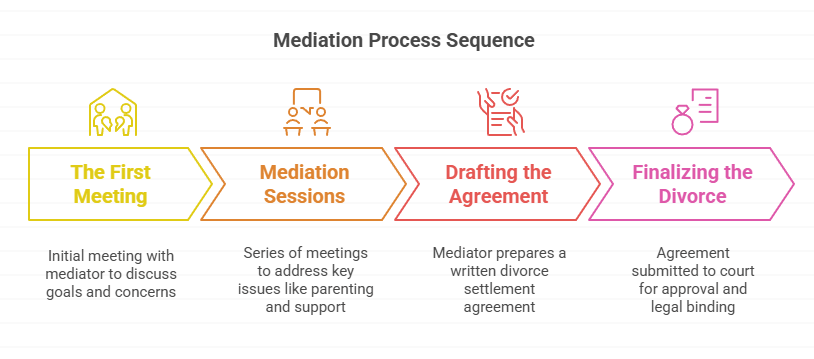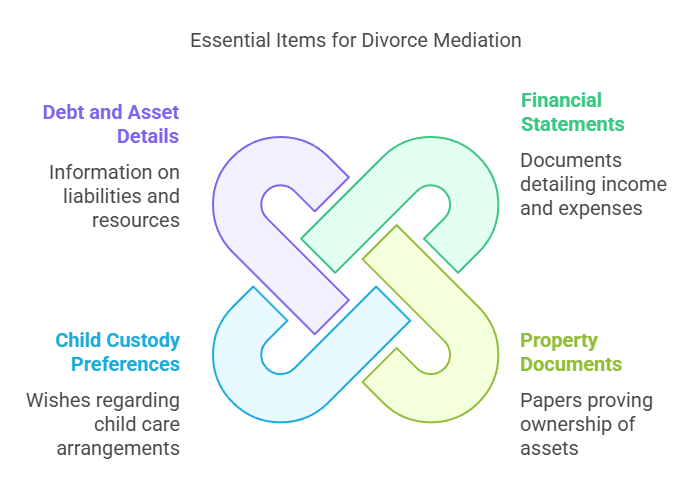Texas Divorce Mediation: A Smarter, Less Stressful, and More Affordable Way to Divorce
Divorce is never easy, but that doesn’t mean it has to be a drawn-out, expensive, and emotionally draining courtroom battle. If you’re facing the end of your marriage in Texas, you might be wondering if there’s a better way to move forward. That’s where divorce mediation comes in.

Instead of battling it out in court, divorce mediation benefits couples by giving them control over their decisions, reducing stress, and saving time and money. Mediation vs. litigation isn’t even a close call when you look at the advantages. In fact, more couples are choosing this court-free divorce option because it leads to a more peaceful, efficient, and cost-effective resolution.
So, if you’re asking yourself, “How much does divorce mediation save?” or “Does mediation reduce conflict?”—you’re in the right place. Let’s break it all down and help you decide if mediation is the right choice for you.
What Is Divorce Mediation? And How Does It Work?
Before jumping in, let’s define divorce mediation. In simple terms, it’s a structured negotiation where a neutral mediator helps both spouses reach agreements on important issues—like finances, child custody, and spousal support—without going to court.
The Mediation Process: Step by Step
Here’s a breakdown of what to expect:
- The First Meeting – You and your spouse meet with a mediator to discuss goals, concerns, and the overall process.
- Mediation Sessions – Over several meetings, you’ll work through important issues like parenting plan mediation, spousal support mediation, and property division.
- Drafting the Agreement – Once everything is settled, the mediator prepares a written divorce settlement agreement.
- Finalizing the Divorce – The agreement is submitted to the court, and once approved, it becomes legally binding.
The best part? Unlike litigation, which can drag on for years, mediation often takes just a few months. How long does divorce mediation take? On average, it’s much faster than a traditional courtroom divorce.
Mediation vs. Litigation: Why More People Are Choosing Mediation
Cost Savings: How Much Does Divorce Mediation Save?
One of the biggest reasons couples choose mediation is cost. The cost of divorce mediation is significantly lower than a full-scale court battle.
- Traditional divorces can cost tens of thousands of dollars in attorney fees and court costs.
- Mediation is typically 40–60% less expensive.
- Who pays for divorce mediation? Usually, both spouses split the cost.
Can mediation reduce attorney fees? Absolutely. Since the process focuses on direct negotiation rather than legal fights, you’re not paying lawyers to argue in court for months on end.
Time Savings: Can Mediation Speed Up Divorce?
If you want to move on with your life sooner rather than later, divorce mediation time savings make it the best option. Court divorces can take over a year, while mediation often wraps up in just a few months.
How does mediation impact divorce timelines?
The answer depends on the complexity of your case, but most couples find it much faster than litigation.
Emotional Stress in Divorce: Why Mediation Is Easier
Let’s be honest—divorce is already emotionally draining. But litigation only adds to the stress. Court battles fuel tension, create hostility, and make moving forward harder.
Does mediation reduce conflict?
Yes! The process is designed to encourage communication in divorce mediation, helping both parties focus on solutions instead of arguments.
And if you have kids? Why is mediation better for children? Because it reduces tension between parents, making co-parenting easier and healthier for everyone.
What Can Be Settled Through Mediation?
One of the most common concerns couples have when considering divorce mediation is whether it can fully address all the critical aspects of their separation. The answer? Yes! Mediation covers nearly everything that would otherwise be settled in court, but in a more amicable, flexible, and cost-effective way.
Since mediation is voluntary, both parties have a say in every decision, leading to higher divorce mediation compliance rates. The neutral mediator facilitates discussions but doesn’t impose solutions—so agreements reflect what works best for both spouses, rather than what a judge thinks is fair.
Let’s break down how divorce negotiation through mediation can settle key issues.
Child Custody & Co-Parenting
If you have children, custody and parenting plans are likely at the top of your priority list. Can mediation help with child custody? Yes! In fact, it’s often the best way to reach a child-focused divorce mediation agreement that works for everyone.
During mediation, parents work together to create a detailed parenting plan mediation that outlines custody arrangements, visitation schedules, and decision-making responsibilities. Unlike a judge who imposes a one-size-fits-all ruling, mediation allows parents to build a plan that fits their children’s unique needs.
Spousal and Child Support
Financial stability post-divorce is critical, and that’s why spousal support mediation is a key part of the process. Whether one spouse needs temporary support during the transition or long-term assistance, mediation helps determine fair terms that work for both parties.
How does mediation affect alimony?
Unlike litigation, where a judge decides the amount, mediation allows spouses to negotiate a realistic, fair support plan. This approach often leads to better divorce mediation compliance rates since both parties have agreed to the terms voluntarily.
Property and Finances
A big concern in any divorce is dividing assets fairly. Does divorce mediation cover finances? Absolutely. Through mediation, couples can address:
- Who keeps the family home?
- How will retirement accounts be divided?
- Who is responsible for debts?
Does divorce mediation help with property division?
Yes! Unlike a court ruling that may not take personal preferences into account, mediation allows couples to split assets in a way that works best for both parties.
Post-Divorce Adjustments
Life changes, and sometimes agreements need to change too. Post-divorce mediation helps couples adjust custody schedules, support payments, and other terms without having to go back to court.
If one spouse experiences a financial shift or a child’s needs change, modifying mediation agreements is a straightforward way to address new circumstances.
Why Mediation Leads to Better Settlements
Mediation empowers couples to shape their own agreements instead of relying on court decisions that might not fit their unique needs. Here’s why divorce mediation success rates are higher than traditional litigation:
✅ More Control Over Decisions: Instead of having a judge make all the decisions, couples create agreements that work for them.
✅ Confidentiality in Divorce Mediation: Unlike public court records, mediation remains private.
✅ Higher Compliance Rates: People are more likely to follow agreements they helped create.
✅ Less Emotional Toll: Why is mediation less stressful than court? Because it reduces conflict and encourages cooperation.
When Is Mediation Not Recommended?
Mediation is a great solution for many couples, but it’s not for everyone.
- If one spouse refuses to negotiate in good faith, mediation won’t work.
- Does mediation work for high-conflict divorces? Sometimes, but it depends on both parties’ willingness to cooperate.
- If there’s a history of domestic abuse, mediation may not be the best option.
Why do some mediations fail?
Usually because one party refuses to compromise or hides financial information.
What if mediation doesn’t work?
You can still go to court, but mediation is always worth trying first.
How to Prepare for Divorce Mediation
Preparation is key to success. How to prepare for divorce mediation? Start by gathering important documents and understanding what you want out of the process.
Divorce mediation checklist:
-
- Financial statements
- Property documents
- Child custody preferences
- Debt and asset details
What documents are needed for divorce mediation?
Anything related to finances, children, and marital assets.
How to get your spouse to agree to mediation?
Explain how it’s faster, cheaper, and less stressful than litigation.
Mediation vs. Arbitration: What’s the Difference?
Some people confuse divorce mediation vs. arbitration, but they’re not the same.
- Mediation is about negotiation, and you control the outcome.
- Arbitration is more like a private judge making a final decision.
For most couples, mediation is the better option because it keeps the decision-making power in their hands.
Final Thoughts: Is Divorce Mediation Right for You?
If you want to avoid the stress, cost, and conflict of a traditional divorce, mediation is worth considering. It saves time, money, and emotional energy—especially if kids are involved.
And the best part? Can divorce mediation be legally binding? Yes, once your divorce settlement agreement is finalized and submitted to the court, it’s just as enforceable as a litigated divorce.
So if you’re wondering, “When should you start divorce mediation?”—the answer is now. The sooner you start, the sooner you can move forward with your life.
If you’re looking for a good divorce mediator in Texas, consider reaching out to Nida Din at (512) 333-0715. With extensive experience in family law and mediation, she helps couples reach fair, thoughtful agreements while keeping the process as smooth and stress-free as possible.
Divorce is hard. Mediation makes it easier. Reach out today and take the first step toward a better resolution.



